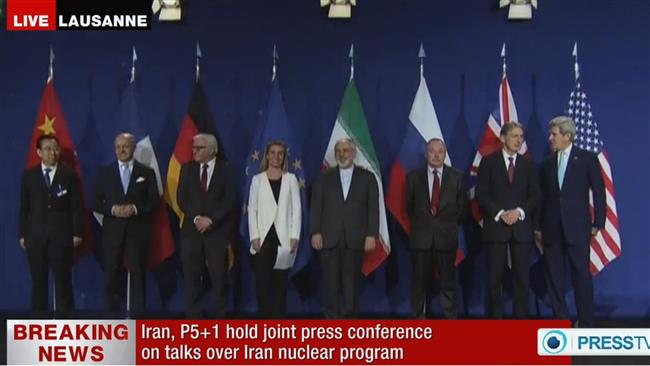Iran, P5+1 joint statement calling for removal of all anti-Iran sanctions

Iran and the P5+1 group of world powers have adopted a joint statement after marathon talks in the Swiss city of Lausanne calling, among other things, for the removal of UNSC resolutions and sanctions against the Islamic Republic.
The statement was read out in a joint press conference in the Swiss city by the EU high representative, Federica Mogherini, and Iran’s Foreign Minister Mohammad Javad Zarif on Thursday.
In the framework of the agreement, none of Iran’s nuclear facilities as well as the previous activities will be stopped, shut down or suspended and Iran’s nuclear activities in all its nuclear facilities including Natanz, Fordow, Isfahan and Arak will continue.
These comprehensive solutions will guarantee the continued enrichment program inside the Iranian territory and according to this, Iran will be allowed to go on with industrial production of nuclear fuel which is meant for running its nuclear power plants.
According to the solutions, the Joint Comprehensive Plan of Action (JCPOA) for enrichment program will cover a 10-year period, during which more than 5,000 centrifuge machines will continue producing enriched material at Natanz facility up to the 3.67-percent level. Extra machines and the related infrastructure in the facility will be collected by the International Atomic Energy Agency (IAEA) in order to be replaced by new machines consistent with the allowed standards. Accordingly, Iran will be allowed to allocate the current stockpile of enriched materials for the purpose of producing nuclear fuel or swapping it with uranium in the international markets.
Iran will continue research and development program on advanced centrifuge machines and will be also able to keep initiating and completing its R & D program on IR-4, IR-5, IR-6 and IR-8 machines in the 10-year period of the agreement.
Fordow facility
According to the joint statement, Fordow nuclear facility will be turned into a research center for nuclear science and physics. More than 1,000 centrifuges will be maintained at this facility and two centrifuge cascades will keep operating. In cooperation with the P5+1 countries, about half of the Fordow facility will be dedicated to advanced nuclear research and production of stable isotopes which have important applications in industry, agriculture and medicine.
Arak heavy water reactor
According to the statement, the heavy water reactor in the Iranian city of Arak will remain in place but will be redesigned and updated. The redesigning process will greatly increase efficiency of the reactor while reducing the amount of plutonium produced in the facility. The redesigning process will be done according to defined scheduled as an international project with cooperation of Iran. Production of fuel for Arak reactor and awarding international nuclear fuel production certificate will be among international cooperation to be offered to Iran.
Additional Protocol
Iran will implement the Additional Protocol temporarily and voluntarily in line with its confidence-building measures and after that the protocol will be ratified in a time frame by the Iranian government and parliament (Majlis).
Removal of Sanctions
Following the implementation of the JCPOA, all the UN Security Council sanctions as well as all economic and financial embargoes by the US and the European Union, including bans on banks, insurance, investment, and all other related services in different fields, including petrochemical, oil, gas and automobile industries will be lifted. Besides, all nuclear-related sanctions against real and legal entities, state and private organizations and institutions, including those sanctions imposed against the Central Bank of Iran, other financial and banking institutions, SWIFT system, and the country’s shipping and aviation sectors, and Iran’s tanker company will be immediately lifted all at once. Moreover, the P5+1 countries are committed to avoid imposing any new nuclear-related sanctions against Iran.
International Cooperation
Iran’s international nuclear cooperation, including with the member states of the P5+1 will be possible and promoted in the fields of building nuclear power plants, research reactors, nuclear fusion, stable isotopes, nuclear safety, nuclear medicine and agriculture. According to the Joint Comprehensive Plan of Action, Iran will be provided with access to global market as well as international trade, finance, technical knowledge and energy.
Schedule for implementing JCPOA
At the end of these negotiations, the two sides will start drafting the JCPOA in the near future to meet the July 1 deadline. Once the text is finalized, the JCPOA will be adopted as a UN Security Council resolution. For the JCPOA to be binding for all UN member states, the resolution will be adopted under the Article 41 of Chapter Seven of the UN Charter to be able to render previous resolutions against Iran null and void.
The parties to the JCPOA will, after the adoption of the Security Council resolution, need a period of preparation time to implement the JCPOA. Once the preparation period is over, and simultaneous with the start of the implementation of nuclear measures by Iran on a designated date the lifting of all sanctions will automatically go into action.
Within the framework of the solutions reached, the necessary mechanism has been envisaged for the mutual reversibility of the commitments included in the JCPOA in case of a failure to meet obligations by each party.
The joint statement released at the end of eight days of intensive negotiations in Lausanne on Thursday is a sign that Iran and its negotiating partners have come to a mutual understanding over Iran’s nuclear program.
Representatives of Iran and the P5+1 group of countries — the United States, Britain, China, France and Russia plus Germany – along with senior officials of the European Union have held talks over the past years to narrow the existing differences on Tehran’s nuclear activities.







